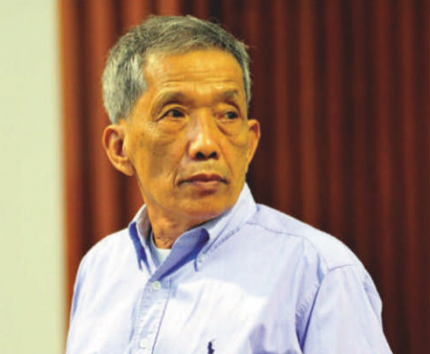He kept his usual neat record of what was done to resisters. “About 20 whippings with fine rattan.” “20-30 whippings with electrical wire.” “Stuffing with water.” He claimed later that he had hated running the prison. He had tried to get sent to the Industry Ministry instead. It was not the torture that troubled him, though he tried to play that down. Nor was it the deaths. He did not see those; the slit throats, the hoe severing the neck, happened elsewhere. His sleep was untroubled by his victims’ faces.
他一如既往地把對抵抗者所做的一切記錄得清清楚楚。“用細藤條打20下。”“用電線打20-30下。”“灌水”。他后來聲稱,他討厭管理監獄。他曾努力轉往工業部。困擾他的并不是折磨,盡管他想努力淡化這一點。困擾他的也不是死亡。他沒有看見那些酷刑;割喉,鋤頭割頸,都是在別處發生的。受害者的臉龐沒有困擾他的睡眠。
What bothered him was that S-21 was meant to be a tool to find out truth. Or so he had convinced himself. Yet perhaps 60% of each “confession” was false, and perhaps 80% of those he sent to death did not oppose the regime. He knew this at the time. Everyone knew it, Angkar included. No one dared say it, for sheer fear. He got through the days, he said later, by quoting Alfred de Vigny: “Energetically perform your long and heavy task/On the path to which Fate has called you/Then…suffer and die without a word.”
困擾他的是,S-21應該是發現真相的一個方法。至少他是這樣說服自己的。然而,也許60%的“認罪”都是錯誤的,或許80%的被他判死刑的人都不反對當局。當時他就知道。大家都知道,包括柬共。出于純粹的害怕,沒有人敢發聲。他熬過了這些日子,后來,他引用阿爾弗雷德·德維尼的話說道:“在命運召喚你的道路上,精力充沛地完成你漫長而艱巨的任務,然后...默默受苦,默默死去。”

To poetry he could add another salve: complete identification with the revolutionary struggle. He had fallen for communism Chinese-style at the Institut de Pédagogie, teacher-training college. That promise of progress and change was irresistible. By the early 1970s he was in the maquis with the Khmers Rouges, learning to fight for a Democratic Kampuchea that would be agrarian, classless and untainted by the West.
他還可以在這個詩歌中加上一條:完全認同革命斗爭。在他在師范學院愛上了中國式的共產主義。進步和變革的希望是不可抗拒的。到20世紀70年代初,他加入了紅色高棉的游擊隊員,學習為民主柬埔寨而戰,一個以土地為基礎,沒有階級,不受西方污染的柬埔寨。
譯文由可可原創,僅供學習交流使用,未經許可請勿轉載。












